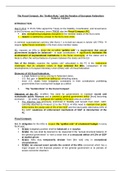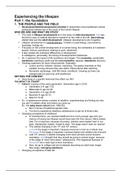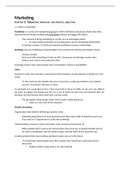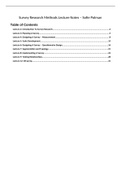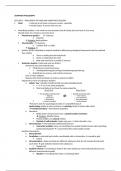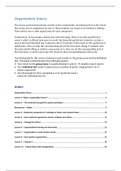The Fiscal Compact, the “Golden Rule,” and the Paradox of European Federalism
Federico Fabbrini
INTRODUCTION
March 2012 25 EU MSs signed the Treaty on the Stability, Coordination, and Governance
in the Economic and Monetary Union (TSCG) aka the Fiscal Compact (FC)
aim: strengthening budgetary discipline in the member states of the Euro-zone;
reason: a satisfactory answer to the Euro-zone crisis;
A common supranational currency (the Euro) + a no-bail-out clause in Article 125 TFEU
require tighter fiscal constraints in the Euro-zone member states
FC: imposes on MSs to enact the so-called “golden rule”—a requirement that annual
government budgets be balanced— in state constitutions significantly increases the
involvement of supranational institutions in the fiscal sovereignty of the states and is
likely to affect the vertical balance of powers between the states and the EU
Aim of the Article: examine the “golden rule” articulated in the FC & the institutional
challenges that its adoption raises in four selected EU MSs; comparison of the
developments in European Monetary Union (EMU) with US fiscal federalism
Elements of US fiscal federalism:
- a single federal currency among its federated states,
- U.S. fed. gov. is barred from bailing out defaulting states,
- most U.S. states have budgetary constraints in their constitutions prohibiting
governments from running their budget at a deficit
I. The “Golden Rule” in the Fiscal Compact
Objective of the FC: re-affirm “the need for governments to maintain sound and
sustainable public finances and to prevent a general government deficit [from] becoming
excessive . . . [in order] to safeguard the stability of the euro area as a whole.”
The objective was previously enshrined in Stability and Growth Pact (SGP, 1997;
currently attached as Protocol 12 to the TFEU) MSs need to maintain their public
deficit below the yearly ratio of 3% of the GDP and the total public debt below 60% of
the GDP; weakness of enforcement mechanism of SGP introduction of the
FC
Fiscal Compact:
Art. 3: obligation for the MSs to respect the “golden rule” of a balanced budget in every
fiscal year;
3(1)(a): budgetary position shall be balanced or in surplus
3(1)(b): the rule shall be deemed to be respected if the “annual structural balance of
the general government” is “with a lower limit of a structural deficit of 0.5% of GDP
at market prices
3(1)(c): MSs may temporarily deviate from [the rule] only in exceptional
circumstances
3(3)(b): an unusual event outside the control of the MSs concerned which has a
major impact on the financial position of the general government or to periods of
severe economic downturn
, 3(1)(e): automatically triggered corrective mechanisms in the event of significant
observed deviations
Art. 3 “golden rule” upon ratification is binding for the 25 MSs as an obligation deriving
from international law
Art. 3(2) requires states to enact the “golden rule” in the state constitutions or — where
this would be substantially impossible — in special domestic sources of law that are
hierarchically superior to ordinary acts of parliament and that can work as benchmarks for
the constitutional review of budgetary laws
To ensure constitutional compliance art. 8 introduces a mechanism of ECJ judicial
enforcement
Non-compliance with the first ECJ decision: ECJ may impose “a lump sum or a penalty
payment appropriate in the circumstances and that shall not exceed 0.1% of its GDP; also:
financial assistance under the European Stability Mechanism (ESM) will be conditional
on compliance with the requirements of 3(2)
II. The “Golden Rule” in State Constitutions
IT, ESP, DE parliamentary system
FR semi-presidential system
A. Germany
Art. 3 FC largely draws from the “golden rule” that Germany enacted in it’s the German
Constitution (GC) in July 2009
New Article §109 GC:
- reaffirmed the budgetary autonomy of the Federation and the Länder,
- noted their joint responsibility in the maintenance of the budgetary discipline set at the
EU level in the SGP,
- introduced the general rule that: the budgets of the Federation and the Länder shall in
principle be balanced without revenue from credits,
- should adjust minor deviations on the basis of the economic cycle, market
developments,
o exceptions: natural disasters & unusual emergency situations; accompanied
by an amortization plan,
- Article 115(2) GC: “[t]his principle shall be satisfied when revenue obtained by the
borrowing of funds does not exceed 0.35 percent in relation to the nominal [GDP].”
a more restrictive deficit brake than Article 3(1)(b) FC (0.5%)
B. Spain
New Article 135 of the Spanish Constitution (SC):
- commitment: [a]ll public administrations will conform their actions to the principle of
budgetary stability,
- State and the Autonomous Communities shall not incur a structural deficit that
exceeds the standard established by the EU,
- maximum structural deficit: specified in organic law (a special source of law with
infra-constitutional but supra legislative status),
- 135(3): constitutionalizes the limits of the SGP on public debt not exceed the
reference value established in the TFEU,
Federico Fabbrini
INTRODUCTION
March 2012 25 EU MSs signed the Treaty on the Stability, Coordination, and Governance
in the Economic and Monetary Union (TSCG) aka the Fiscal Compact (FC)
aim: strengthening budgetary discipline in the member states of the Euro-zone;
reason: a satisfactory answer to the Euro-zone crisis;
A common supranational currency (the Euro) + a no-bail-out clause in Article 125 TFEU
require tighter fiscal constraints in the Euro-zone member states
FC: imposes on MSs to enact the so-called “golden rule”—a requirement that annual
government budgets be balanced— in state constitutions significantly increases the
involvement of supranational institutions in the fiscal sovereignty of the states and is
likely to affect the vertical balance of powers between the states and the EU
Aim of the Article: examine the “golden rule” articulated in the FC & the institutional
challenges that its adoption raises in four selected EU MSs; comparison of the
developments in European Monetary Union (EMU) with US fiscal federalism
Elements of US fiscal federalism:
- a single federal currency among its federated states,
- U.S. fed. gov. is barred from bailing out defaulting states,
- most U.S. states have budgetary constraints in their constitutions prohibiting
governments from running their budget at a deficit
I. The “Golden Rule” in the Fiscal Compact
Objective of the FC: re-affirm “the need for governments to maintain sound and
sustainable public finances and to prevent a general government deficit [from] becoming
excessive . . . [in order] to safeguard the stability of the euro area as a whole.”
The objective was previously enshrined in Stability and Growth Pact (SGP, 1997;
currently attached as Protocol 12 to the TFEU) MSs need to maintain their public
deficit below the yearly ratio of 3% of the GDP and the total public debt below 60% of
the GDP; weakness of enforcement mechanism of SGP introduction of the
FC
Fiscal Compact:
Art. 3: obligation for the MSs to respect the “golden rule” of a balanced budget in every
fiscal year;
3(1)(a): budgetary position shall be balanced or in surplus
3(1)(b): the rule shall be deemed to be respected if the “annual structural balance of
the general government” is “with a lower limit of a structural deficit of 0.5% of GDP
at market prices
3(1)(c): MSs may temporarily deviate from [the rule] only in exceptional
circumstances
3(3)(b): an unusual event outside the control of the MSs concerned which has a
major impact on the financial position of the general government or to periods of
severe economic downturn
, 3(1)(e): automatically triggered corrective mechanisms in the event of significant
observed deviations
Art. 3 “golden rule” upon ratification is binding for the 25 MSs as an obligation deriving
from international law
Art. 3(2) requires states to enact the “golden rule” in the state constitutions or — where
this would be substantially impossible — in special domestic sources of law that are
hierarchically superior to ordinary acts of parliament and that can work as benchmarks for
the constitutional review of budgetary laws
To ensure constitutional compliance art. 8 introduces a mechanism of ECJ judicial
enforcement
Non-compliance with the first ECJ decision: ECJ may impose “a lump sum or a penalty
payment appropriate in the circumstances and that shall not exceed 0.1% of its GDP; also:
financial assistance under the European Stability Mechanism (ESM) will be conditional
on compliance with the requirements of 3(2)
II. The “Golden Rule” in State Constitutions
IT, ESP, DE parliamentary system
FR semi-presidential system
A. Germany
Art. 3 FC largely draws from the “golden rule” that Germany enacted in it’s the German
Constitution (GC) in July 2009
New Article §109 GC:
- reaffirmed the budgetary autonomy of the Federation and the Länder,
- noted their joint responsibility in the maintenance of the budgetary discipline set at the
EU level in the SGP,
- introduced the general rule that: the budgets of the Federation and the Länder shall in
principle be balanced without revenue from credits,
- should adjust minor deviations on the basis of the economic cycle, market
developments,
o exceptions: natural disasters & unusual emergency situations; accompanied
by an amortization plan,
- Article 115(2) GC: “[t]his principle shall be satisfied when revenue obtained by the
borrowing of funds does not exceed 0.35 percent in relation to the nominal [GDP].”
a more restrictive deficit brake than Article 3(1)(b) FC (0.5%)
B. Spain
New Article 135 of the Spanish Constitution (SC):
- commitment: [a]ll public administrations will conform their actions to the principle of
budgetary stability,
- State and the Autonomous Communities shall not incur a structural deficit that
exceeds the standard established by the EU,
- maximum structural deficit: specified in organic law (a special source of law with
infra-constitutional but supra legislative status),
- 135(3): constitutionalizes the limits of the SGP on public debt not exceed the
reference value established in the TFEU,


